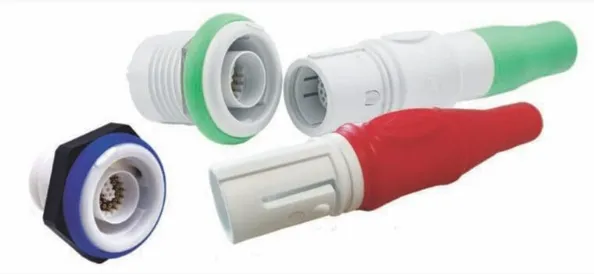Reusable and limited-reuse connectors must perform the same work as the reusable version, but cost, functionality and environmental impact play a greater role in their design. Reusable products are mainly applied in the medical field, maximizing patient safety by preventing cross-contamination and infection. They are also used in food processing, research laboratories and industrial processes that require a sterile environment.
FDA regulations, EPA restrictions, Reach and RoHS compliance, the use of hazardous materials or conflict minerals can all affect the manufacture of a device that provides a high level of care. Important considerations for reusable connectors include:
Safety
Cleaning
Reliability
Cost per use
Be capable of combining one-time use with limited reuse or reusable components
The trend towards higher voltage and higher density
For example:
The HyperGrip series of Smiths Interconnect includes disposable plugs and sockets suitable for HG2 and HG4 sizes. They are designed to support over-molding and high-capacity production methods. They can withstand at least 30 cycles while ensuring the insulation resistance, dielectric withstand voltage, current carrying capacity and low-level current resistance performance of the connectors. HyperGrip is a circular plastic, user-configurable, color-coded connector with a push-pull lock design that allows for one-handed disconnection. HyperGrip is designed to meet the requirements of the medical industry, such as fing-proof design in compliance with IEC 60601, UL94 flame retardant grade, and compatibility with most sterilization requirements.
Design Description
Standards: FDA, EPA, Reach, RoHS, IEC 60601, UL, CSA
Pairing cycle: A limited number of pairing cycles, typically 10 to 30 times.
Connection methods: locking type, non-locking type, breakable type
Contact pieces: According to performance requirements, applicability for specific applications, and cost-effectiveness, helical hyperbolic contact systems, stamped hyperbolic contact pieces, edge card contact pieces, and spring probes are usually selected. Pneumatic and fluid contact parts are used to handle gases, brine or suction. Optical fiber contacts for imaging, sensing and data transmission are crucial for many emerging technologies; However, its cost and complexity are quite high.
Termination: To reduce costs while maintaining performance, a more economical termination method than welding may be used.
Material specifications: Material selection must strike a balance between cost-effectiveness, durability and chemical compatibility. The shell and components are made of plastics and thermoplastics, such as polybutylene terephthalate (PBT), polycarbonate (PC), acrylonitrile-butadiene-styrene (ABS), polyvinyl chloride (PVC), and polyurethane (PUR). In medical applications, for instance, polyetheretherketone (PEEK) and polyarylsulfone (PPSU) are used due to their resistance to sterilization and chemicals.
Environmental characteristics: Anti-fingerprint (conforming to IEC 60601 standard), flammability grade (UL94), ethoxyethane sterilization, secondary injection molding
The protection level depends on the specific application and environmental conditions. For example, the HyperGrip protection level of Smith Interconnect is IPX4.
Market
Medical care, industry
Application
Medical applications (e.g., electrocardiogram, endoscopy), food processing, research laboratories